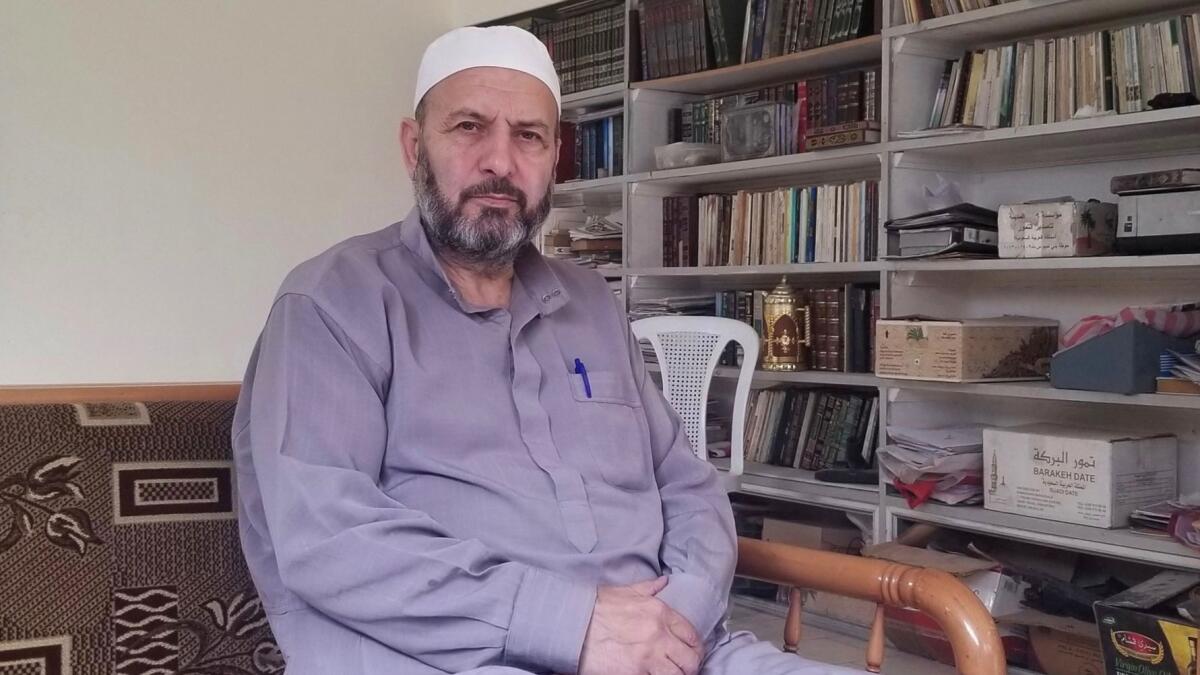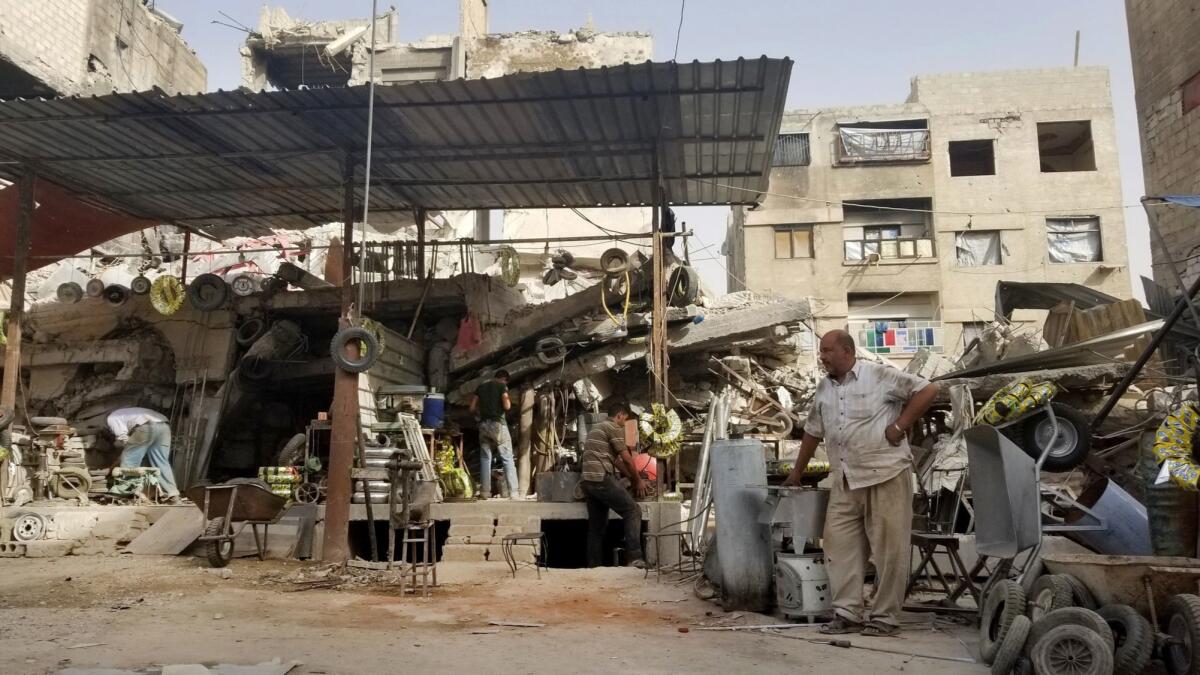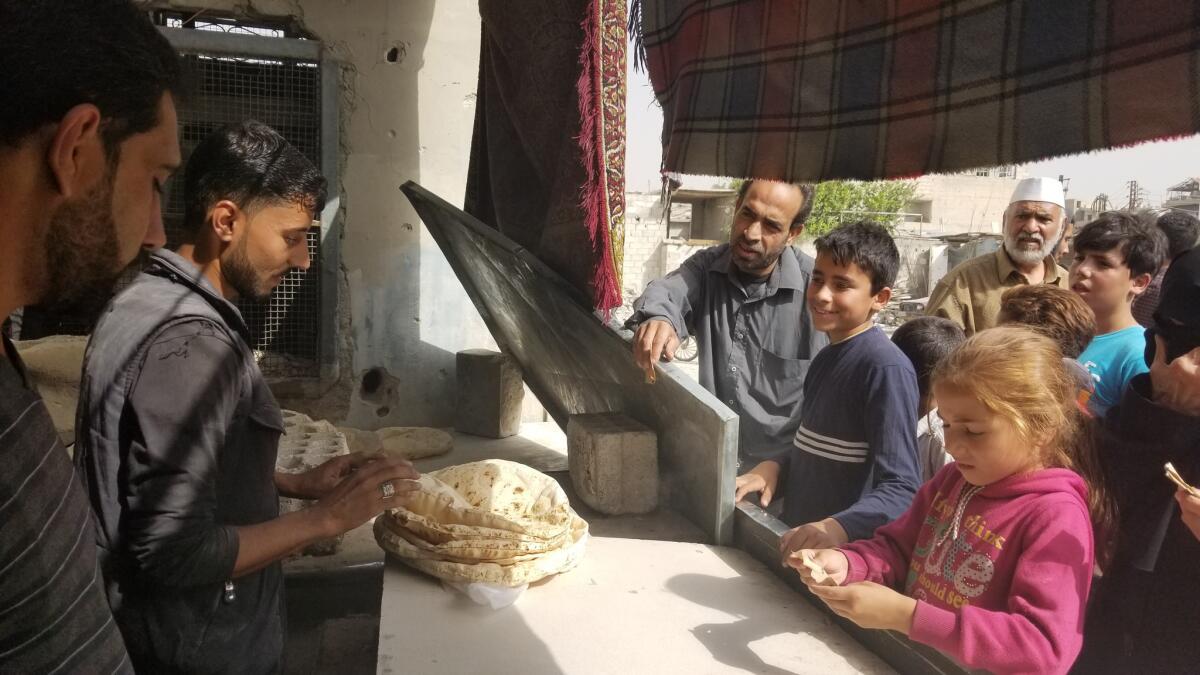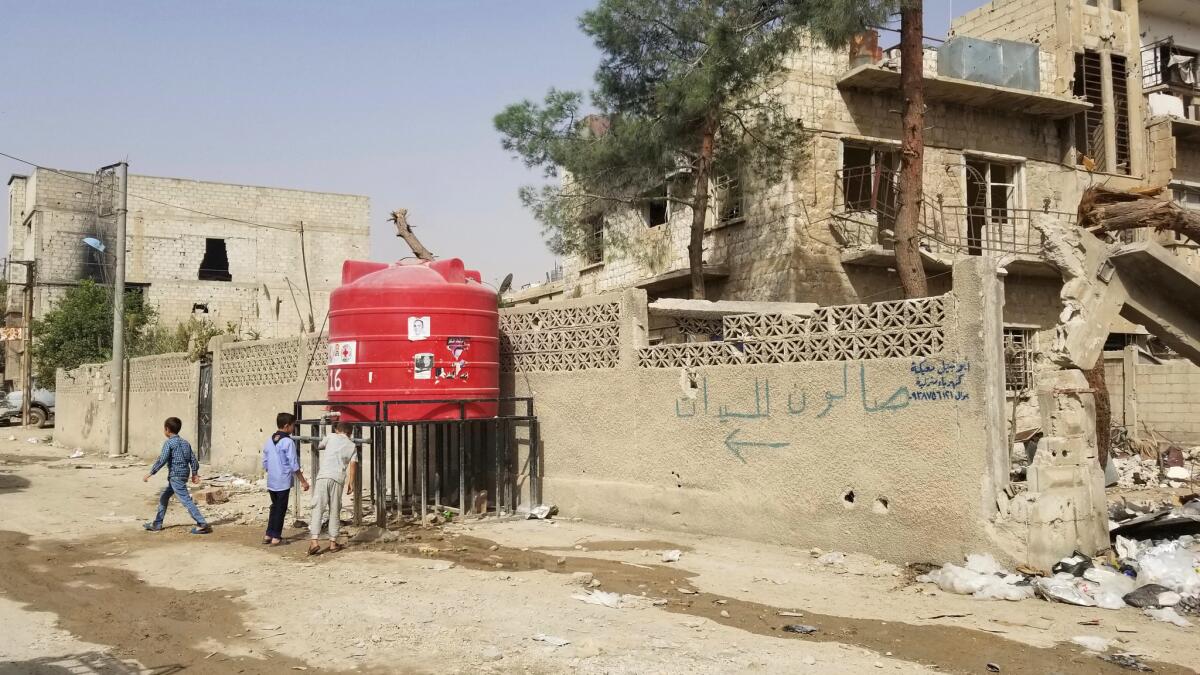For Syrians in a former rebel bastion, reconciling with the government means a return to normalcy — at a price

In Duma, residents trudge through streets lined with concrete piles where people once lived.
Reporting from Duma, Syria — It was September 2011 when Bassam Dufdaa, the preacher in the Syrian town of Kafr Batna, threw his support behind the uprisings raging throughout the country. From his pulpit in the town mosque, and in a video uploaded to YouTube, he called on people to fight back against the army and join the revolution against President Bashar Assad.
Fast-forward seven years: Dufdaa appeared in another video, this time extolling Assad as “the great fighter” and thanking him for protecting the country “despite the power of those you confronted.”
“We knew you were in the right, that victory would be your ally, and this is what happened,” he said in the video, published in March.
Now Dufdaa is honored by the state, which calls him a hero for guiding his town into a reconciliation agreement with the government. His move helped spare Kafr Batna from almost certain destruction during the Russian-backed onslaught to take back the Ghouta region, a collection of Damascene suburbs and agricultural areas that until March had been a rebel enclave.
But for others, Dufdaa’s name — which resembles the word “frog” in Arabic — has become shorthand for betrayal. Now those calling for reconciliation are branded “frogs,” and Dufdaa’s role in the government’s bloodless takeover of Kafr Batna is seen as a nothing less than surrender to a reviled enemy.

His choice is emblematic of the calculations that must be made by many of those living in former rebel strongholds back under government control: Salvage the remains of your life and live under an amnesty from a state you don’t necessarily support, or refuse the agreement and be crushed in the government’s onslaught or sent into exile.
To drive through towns in the Ghouta region is to understand the price of those choices.
In Duma, the region’s largest town and the last to surrender, residents trudge through streets lined with concrete piles. Whole neighborhoods appear pixelated, fenced by the gray skeletons of buildings.
The town had already seen some of the fiercest fighting in the war when the offensive started in March. Russian and Syrian warplanes paved the way for pro-government fighters to cleave Ghouta into three parts and encircle each portion of the rebel bastion.
A rain of mortar shells, artillery and bombs followed. Rebels in Duma continued fighting. But in April, a week after a suspected chlorine attack on Duma that was widely blamed on loyalist forces, the town’s dominant rebel faction, the Army of Islam, surrendered its heavy weapons and accepted safe passage north to Idlib province.
Hundreds of thousands remained, including Samer Alaaya, a 50-year-old blacksmith.
“We were praying we would be safe even if we had nothing left — and that’s what we got,” he said recently, giving a weak smile as he patched up metal cylinders for gas heaters on the side of the street near a rubble heap.
“We lost our houses. Our gold, our clothes, our cars, everything was inside. But at least we rid ourselves of this crisis.”
Behind him, an uneven stack of pancaked concrete floors and rusted rebar marked the remains of the family home. Only part of the foyer and basement remained. Alaaya’s workshop rested on what was once the building’s entrance.
Two of his sons, Rami, 15, and Naji, 21, walked up from the basement to join him.
His sons’ schooling had been interrupted by the war, Alaaya explained. They now worked with him.
“He should be in the seventh grade, but he can’t read,” Alaaya said, pointing to Rami. “He says he’s had enough of education in schools.” Naji, he continued, had managed to finish ninth grade and now wanted to join the army.
“My eldest son, Mohammad, is still in the building,” Alaaya said.
The smile that had been a fixture on Alaaya’s dust-lined face disappeared. He bit his lip, wincing against his tears.
The building, he explained, had collapsed with Mohammad in it, as the rest of the family sheltered in the basement.

Alaaya’s brother had also been killed, he said; they had no cranes or heavy equipment to pull out the bodies.
For now, the rest of the family lives in a half-destroyed abandoned building across the street. (“Yes, it’s leaning a bit, but at least we have a place to sleep,” he said.) And there is plenty of work repairing whatever residents salvage from the ruins of their homes.
Alaaya recovered his smile. “We’re happy. We’re no longer living in the darkness,” he said, referring to the more than six years of conflict around them.
Alaaya’s workshop was on a busy thoroughfare, with motorcyclists and children on bicycles dodging a group of residents gathered near a bakery. Others stopped at storefronts that had materialized in the midst of collapsed roofs and walls crenelated by shells.
Although running water and electricity were still in short supply, “we’re in a thousand blessings compared to before,” said Mohammad Shami, a 43-year-old father of four who had reopened his family’s falafel shop.
A government blockade started in 2013 against the town had spurred food shortages and caused prices to skyrocket, Shami said. He also accused the rebels of imprisoning anyone who didn’t agree with them.
Since the rebels’ ouster, prices had gone down and supplies were available, Shami said, another sign of improvement after Duma’s “return to the homeland’s embrace,” as government statements describe reconciliation agreements.
Syria’s omnipresent security services returned as well, along with small groups of Russian military police watching over aid distribution points and pop-up state offices.


Though Duma is only 10 minutes away from the capital, access remains tightly controlled; residents must apply for permits to leave the city and register at a checkpoint at the town’s entrance near the Damascus-Homs highway.
Shipments of goods, water and fuel, as well as visits by journalists and aid groups to the area, require permissions from a multitude of security branches in a bureaucratic labyrinth.
Most people here must now reconnect with a state that has been absent for years — renewing IDs and registering marriages, births and deaths — and pay fines for not doing so in their time under the rebels’ rule.
Things are easier in Kafr Batna. There, security and intelligence personnel are said to be more pliable in their dealings with the townsfolk, and the return of state institutions has sped the restoration of basic services.
Uniformed children run out of one of the town’s schools, which were relatively unscathed.
Much of the credit for Kafr Batna’s favored status with the government lies with Dufdaa, a popular cleric with a sizable following in the Sufi school of Islam he helped spread through several towns in the Ghouta region.
Speaking in the den of his tree-enveloped house in Kafr Batna recently, he echoed the government’s line that uprisings were a foreign conspiracy driven by “external pressure and external money.”
He had begun to openly speak of reconciliation early in the war, but was soon pressured to stop preaching at the mosque by rebel factions in control of the area, Faylaq al Rahman and Al Qaeda-linked Nusra Front, he said.
He would reappear at various junctures over the years, when factions’ infighting and their inability to break the siege on Ghouta increased residents’ support for talking to the government. Dufdaa would then reach out to officials, informing them he was advocating for reconciliation, but the factions would learn of his efforts and threaten him to stop, he said.
“There was communication. We never cut off communication with the state,” Dufdaa said.
In March, when pro-government forces took towns close to Kafr Batna, Dufdaa again called for reconciliation.
This time he found ready ears from fighters who believed the battle for the enclave was lost. They abandoned their rebel groups and joined residents who had taken up arms to defend Dufdaa against militants, including jihadis, who accused him of treachery and dispatched their cadres to execute him, he said.
Government forces entered Kafr Batna on March 18. Less than a month later, all of the Ghouta region was declared to be under government control.
The choice, to reconcile or fight to the death against Assad and his allies, is now facing almost 3 million people in Idlib province. A cease-fire agreement brokered by Russia and Turkey has put a government offensive on hold, but the peace has already been broken in minor skirmishes and by Russian airstrikes following a suspected rebel chemical attack.
For Dufdaa, the government’s retaking of Ghouta augurs the end of the war. The return of state rule to all the country and moving away from the chaos of fractious rebel factions is the only way forward, he believes.
“Whatever the price we pay, it would be less than what the country would have paid without reconciliations,” he said.
“This isn’t surrender. It’s a return to normalcy.”
Twitter: @nabihbulos
More to Read
Sign up for Essential California
The most important California stories and recommendations in your inbox every morning.
You may occasionally receive promotional content from the Los Angeles Times.











